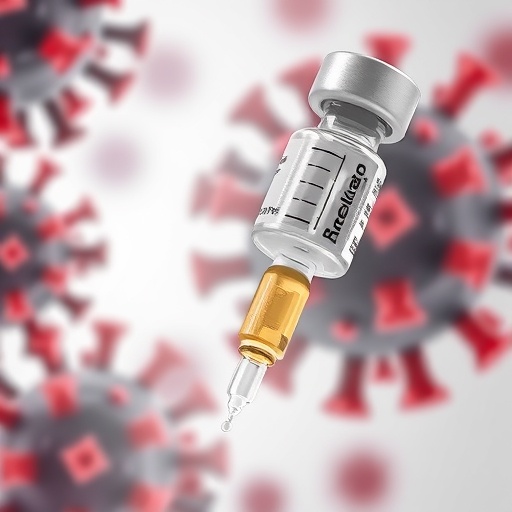In recent years, the global community has faced unprecedented challenges brought about by the COVID-19 pandemic. Among the numerous impacts of this virus, the potential effects on individuals with kidney disease have emerged as a significant area of research. Understanding the intersection of COVID-19 vaccination and kidney disease is crucial, especially as health authorities mobilize efforts to vaccinate vulnerable populations. This article delves into the findings of a pivotal study that explores how COVID-19 vaccination influences the health outcomes of individuals suffering from kidney diseases.
The study led by Carlson, Michalik, and Gerds, published in the Journal of General Internal Medicine, captures the essence of ongoing research into the long-term implications of COVID-19 vaccination for patients with kidney ailments. As a demographic that often faces multifaceted health challenges, integrating insights regarding their COVID-19 vaccination status is critical. The study’s findings suggest that vaccination’s protective benefits extend to these patients, significantly reducing the risks of severe disease outcomes due to COVID-19 infection.
The research underscores the importance of vaccination against COVID-19 for patients with chronic kidney disease (CKD). COVID-19 can exacerbate existing health issues, and individuals with kidney disease exhibit higher mortality rates when infected. As a result, the need for vaccinations becomes imperative, not just as a precautionary measure but as a critical step to enhance their resilience against the virus. The findings indicate that vaccinated patients with CKD showed decreased hospitalization rates, reinforcing the vaccine’s value in mitigating severe disease episodes.
Additionally, the study elucidates the unique challenges encountered by kidney disease patients, particularly those on dialysis or awaiting kidney transplantation. The immune response in this population may differ from the general population, necessitating tailored health strategies. The study prompts further examination of vaccine response in patients with reduced kidney function and suggests the need for continuous immunization efforts and regular monitoring of vaccine efficacy and safety in these cohorts.
In evaluating the safety of COVID-19 vaccines in renal populations, the research reviewed data encompassing varied vaccine platforms, including mRNA and vector-based options. Initial concerns regarding potential adverse effects were largely assuaged by the study’s findings, showing that the vaccines did not lead to significant renal complications. This is vital information as healthcare providers consider recommending vaccinations to their patients with kidney diseases. While the long-term impact of these vaccines on kidney function remains an open question, initial evidence is promising.
Furthermore, the issue of vaccine hesitancy among patients with kidney disease is explored. Concerns over the adequacy of immune responses and side effects have deterred some patients from receiving vaccinations. The research highlights the need for educational initiatives to empower patients with knowledge and reassurance about vaccine safety. Engaging healthcare providers to facilitate conversations can help to dispel myths and address legitimate concerns surrounding vaccination, enhancing uptake rates.
The researcher team also examined the possible correlations between dosage regimens and antibody response in kidney-compromised patients. The findings articulate that while most patients showed positive immune responses post-vaccination, some may require additional doses to achieve optimal antibody levels. This revelation sparks debate about personalized vaccination schedules tailored to meet the needs of kidney patients, which could improve their immunity against COVID-19.
In discussing the broader implications of these findings, it becomes clear that vaccination strategies must evolve, especially for vulnerable populations. Policymakers and healthcare leaders must consider data from studies like this when formulating vaccination guidelines and recommendations. The emphasis should also be on delivering equitable healthcare access to ensure that all patients, particularly those with kidney diseases, receive timely immunizations without barriers.
As the world moves forward in managing COVID-19, it is paramount to keep the needs of at-risk populations, such as those with kidney disease, at the forefront. The ongoing dialogue spurred by this research calls for continuous investigation into the adaptive immune responses following vaccination, especially in terms of longevity and effectiveness against emerging variants of the virus.
The study’s emphasis on collaboration among nephrologists, primary care providers, and public health officials illustrates the intricate nature of COVID-19’s impacts on diverse patient populations. By unifying efforts and sharing insights from research such as this, the healthcare community can enhance the level of care delivered to those affected by kidney diseases.
As more data emerges, ongoing surveillance and research will play a pivotal role in shaping our understanding of COVID-19, its vaccine, and its implications for patients with kidney disease. Continuing to prioritize their health in pandemic responses will be crucial in achieving better health outcomes for all.
In conclusion, Carlson, Michalik, and Gerds’ research provides groundbreaking insights into the relationship between COVID-19 vaccination and kidney health, affirming the importance of vaccination. Their work serves as a crucial reminder of the ongoing need for research tailored to understanding health complexities in vulnerable populations. As society strives for recovery from the pandemic, studies like these lay down the groundwork for informed decision-making and improved healthcare strategies.
Subject of Research:
Article Title: COVID-19 Vaccination and Kidney Disease
Article References: Carlson, N., Michalik, F., Gerds, T. et al. COVID-19 Vaccination and Kidney Disease. J GEN INTERN MED (2025). https://doi.org/10.1007/s11606-025-10033-7
Image Credits: AI Generated
DOI: https://doi.org/10.1007/s11606-025-10033-7
Keywords: COVID-19, vaccination, kidney disease, chronic kidney disease, renal health, vaccine efficacy, patient care, immune response.




